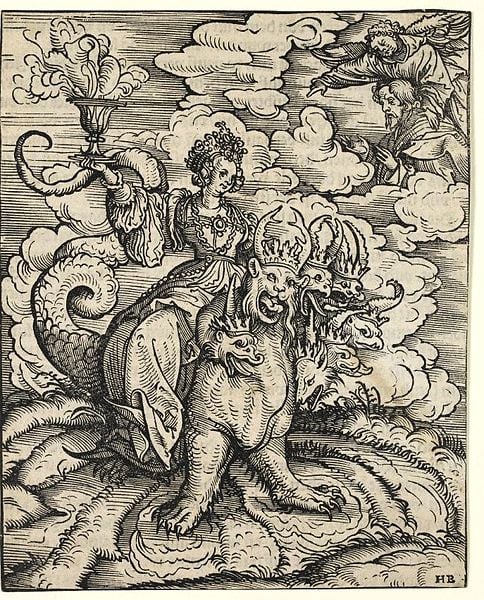***
***
*
*****
I will be improving upon this, Lord willing, as time allows.
I sure hope so, because it is a pathetic historical “argument” thus far: wrong and incoherent at every turn.
This book and my friend’s conversion to Rome in 1996 was one of the main reasons I sought to understanding early church history and the early church fathers better, and apologetic answers to the issues that Rod was bringing to me.
Unfortunately, that understanding has advanced very little these last 18 years. And it won’t, as long as the fathers are viewed through the dim, decrepit glass or “filter” of anti-Catholic bias.
A few months after I returned from the mission field in Turkey, he called me (I think, it was sometime early in 1996 ? I cannot remember exactly) and invited me and my brother to his house. I had just been reading R. C. Sproul’s book, Faith Alone. It was a real shock when he announced he was converting to Roman Catholicism. We then had 8 years (1996-2004) of informal debates by sometimes 5 hour discussions, lunches, emails, phone calls, etc. Then, sometime in 2004, Rod told me he did not want to “debate” or discuss theology anymore.
I think we can see why . . . I spent 11 years online trying to debate anti-Catholics (the papers remain up on my Anti-Catholicism page) and finally gave up in 2007, since it was always a completely futile effort. This present effort is strictly an exception to my rule, as explained in Part I. The only redeeming value such exchanges have is for those reading, who may be able to be persuaded to see how very bad and misleading anti-Catholic arguments about the Church fathers are. Once in a blue moon an anti-Catholic is persuaded of the truthfulness of Catholicism. It does happen. Scott Hahn was an anti-Catholic. I was not; but I was extremely “pro-Protestant” as the superior option.
I was motivated to find answers, even though I basically knew that Roman Catholicism was wrong; I was seminary trained afterall (smile), and thought I had a fairly good grasp of church history. However, 3 courses in church history does not adequately prepare one for these arguments that most Evangelicals had never heard before.
Exactly right.
Rod was using a lot of Cardinal John Henry Newman and his “development of doctrine hypothesis” and other former Evangelical Protestants like Scott Hahn and similar arguments that other Roman Catholics, both former Evangelicals and cradle Catholics make, like . . . Jimmy Akin, Patrick Madrid, Mitch Pacwa, Robert Sungenis, Tim Staples, Peter Kreeft, Kenneth Howell, the Surprised by Truth book series, Karl Keating, Catholic Answers, etc. were making. That is what motivated me to find Dr. White’s materials, web-site, and debates (around 1996), and James Swan’s work here, and other good answers by William Webster, David King, Eric Svensen, R. C. Sproul, John Bugay, and Jason Engwer, Steve Hays, and others at Triablogue, Keith Matthison, Turretinfan’s blog, and Michael Kruger’s material on the canon.
We are what we eat. I’m familiar with all the anti-Catholics listed, excepting Kruger, and have refuted them all, again and again (see them listed under their names on my Anti-Catholicism page). Webster and King, especially, have shown times without number that they don’t have the slightest clue what they’re talking about, when it comes to Church history (i.e., in the conclusions they draw). Both men are completely out to sea when attempting to discuss Cardinal Newman and/or development of doctrine. One can either understand a subject matter or not. They do not. To see why I believe that (mine is not mere empty rhetoric), read the papers I have written about them. I’ve done the homework. I’ve shown how they distort facts and engage in sophistry and historical obfuscation and obscurantism. Even their own credentialed Protestant historians don’t agree with them.
Oddly enough,. Ken gravitates to the very worst historical argumentation from anti-Catholics with an axe to grind. We are what we eat. If this garbage is all that Ken reads on the topic (from his “side”), then he will come out regurgitating the same fallacious arguments. I know from personal experience with Ken, that he keeps repeating the same thing over and over, like a parrot, no matter how many times he is refuted. This is standard anti-Catholic methodology. If roundly refuted, simply assert the same thing again as if nothing had happened. It may impress, say, a six-year-old, but not a conscious, sane adult who actually understands what true dialogue and the burden of proof require.
Since that time, there has emerged other Evangelicals converting to Rome, such as the Called to Communion web-site and other folks like Jason Stellman and Frank Beckwith, also making the same basic arguments.
And we see the same desperate, pathetic, utterly fallacious, false “arguments” attempted by anti-Catholics against them.
I have waited a long time to publish this, because I never wanted to hurt Rod personally, and, the biggest reason, is that I also felt I really needed to study the issues deeper. I hope anyone and everyone who comments will keep the discussion to the issues and not go ad hominem or bombast on either side.
I think Ken is a nice guy. He’s probably the nicest anti-Catholic person I’ve met, and truly does refrain from ad hominem attacks. He writes mainly on a site whose owner is on record, saying (with a straight face!) that I am a psychotic. Steve Hays has said that I am of “evil character” and Eric Svendsen (since, thankfully departed from the Internet) made a satirical spoof claiming that I am in league with Holocaust deniers. “Dr.” (???) White has made every insult under the sun about me.
But despite all, hanging around all these slanderers, whom he trusts as legitimate sources for serious theological and historical argument, Ken maintains his gentlemanly demeanor. I greatly appreciate and commend that. It’s his arguments that I think are atrocious and terrible. It’s not “personal” on my end anymore than it is personal from Ken against Rod (I believe him when he states that). But bearing false witness against fellow Christians (in the doctrinal sense) is a serious offense. That is what we object to.
I will delete any comment I think is mocking or bombast or ad hominem or off topic. Another reason I have not done this before is that I personally think some on my side are too hot-headed and mocking; and that is not a good witness for Christ.
Very true, and I commend Ken for saying it. Believe me, I know, having been on the receiving end of such mockery online for 18 years.
As an additional note, I really appreciate what Dr. White has been saying recently on recent Dividing Line programs; to some other Reformed folks who go overboard against Arminians and Charismatics and those that are not balanced when dealing with Muslims and Islam. We need to both stand for the truth and be godly in our behavior. Let that be a warning.
And let it become a trend. But, sadly, I see no sign whatever of that happening. Ken would have to rebuke the folks above publicly and by name, if he thinks it would ever stop or even lessen. But if he did that, he’d quickly become a pariah in his own community and would be outcast. Anti-Catholics don’t police themselves. Ken makes these general condemnations of insults, which is good, but he won’t rebuke specific examples of it by the big shots of anti-Catholicism. So nothing really changes. Glad to see “Dr.” [???] White softening a bit about Arminians. Back in 1995, in our postal debate, he claimed that I was never truly a Protestant because I wasn’t a Calvinist.
Please pray for Rod Bennett. If and when Rod sees this, I hope he will see my efforts are focused on doctrines and principles and issues, historical facts, and not ad hominem attacks.
I think he would see that. I see it. But the arguments are absolutely pathetic and weak. That‘s what I assert, and Rod would agree, no doubt.
Except for baptismal regeneration, none of the dogmas or doctrines that Rome claims were there, were actually there, in the same way that Rome promotes them today.
“In the same way” refers to development of doctrine, which is a huge discussion, and a topic that anti-Catholics to a person misunderstand or don’t understand at all. I have the experience in debate with them to make this claim, believe me.
(Baptismal regeneration is the one belief in the early church that seems to be there; but without the ex opere operato RC take on it; but, even then, I sincerely believe that the early comments and interpretions on John 3:5 and Titus 3:5, and related passages, etc. were wrong on that issue. It was a wrong interpretation of the Biblical texts.)
If Ken can see this fact, then it is within the realm of possibility that he can come to see that a host of other Catholic doctrines were also present in the fathers. A ray of hope . . .
Just because the early church used the words “catholic” or “eucharist” or “tradition” or “bishop”, etc. does not mean what Rome claims they mean.
I will see how he argues these things specifically, in Part III. It’s easy to assert things; much more difficult to demonstrate them.













